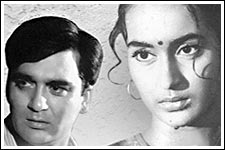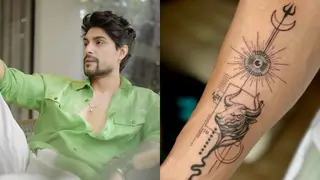| Synopsis An untouchable girl is sheltered in infancy in an emergency, when her kinfolk die in a plague epidermic, by an engineer, Upendranath Choudhury (Tarun Bose), and his wife, Charu (Sulochana), of Brahmin caste. The family assumes the arrangement to be temporary hoping a suitable home would be found for the child. In the course of various postponements of finding the girl a home, the family becomes attached to the child and she is brought up with their own daughter of similar age. The untouchable girl is named Sujata meaning well born. In later years as the girls grow Sujata (Nutan) is sometimes referred to by acquaintances of the family as their daughter. Charu always parries this but says that Sujata is like her own daughter. Sujatha though growing up in an atmosphere of love is aware from this phrase that she is in some way different from the girl she regards as her sister. The parents are not especially troubled by Sujatha's outcast origin till it becomes time to arrange the marriage of their own daughter, Rama (Shashikala). Rama's marriage has been discussed for years with another Brahmin family whose scion is the handsome and promising Adhir (Sunil Dutt). The family is deeply disturbed that an untouchable girl has so long lived in Rama's house. However they consider themselves modern and feel the marriage should go ahead provided the untouchable girl is first married off to a suitable husband wishing to avoid her presence at the wedding. But a complication has developed. Adhir, during his few visits to the house has fallen in love with Sujatha and wishes to marry her and not Rama. Charu is outraged that the marriage of her own daughter has been frustrated by the untouchable girl they have sheltered. Finally at the end when Sujatha donates blood to save Charu's life, the latter relents and calls Sujatha her daughter and marries her to Adhir. The film To Bimal Roy any form of injustice was unacceptable be it social, religious or economic. Sujata looking at the plight of untouchability remains one of the most humanistic films made on the subject. Sujata saw Bimal Roy returning to more realistic imperatives after the comparatively lightweight Madhumati and Yahudi, both of which incidentally were big successes at the box-office. Bimal Roy showed himself to be one of the first Indian directors capable of simplicity and understatement. Sujata is a sensitively directed film with the romantic scenes between Adhir and Sujata almost lyrical. The story is told in a series of deft, restrained episodes never ever lapsing into self-pity that could have easily marred the film. And unlike a PC Barua, whose classic Devdas Bimalda had photographed before remaking the film himself, where a death or two would have seen the story out of its tangled web, Bimalda asserts that such a marriage is possible. Adhir takes a firm hand with his family and has his way. Sujata sees yet another tour de force performance from Nutan in the central role. It is perhaps surpassed only by her performance in the other Bimal Roy film she did, Bandini. Nutan enacts the role of the untouchable girl with stunning grace and is able to convey her hurt, her trauma with just a glance or a gesture. She proves once again what a thinking actress she was. One who tried to fathom the inchoate motivations of the characters she played. She could convey much more with just a look or a fleeting glance than most actresses could with expansive dialogue. In fact Lata Mangeshkar, no less, singled her out as the heroine whose expressions came closest to suggest that she was actually singing the song herself. Though he is burdened with being the only representative of the progressive forces ranged against oppressive tradition and despite the role not being fleshed out totally Sunil Dutt shines as he plays the earnest Adhir as a perfect foil to Nutan. He realizes it is her film and at no times tries to corner any of the limelight for himself. The rest of the cast support the lead pair perfectly The film is shot handsomely with rich lyrical tonal quality and evocative framing that bring out the human emotions of the story. And helping to lift the film several notches is its evergreen musical score by S.D. Burman. The film is laced with such masterpieces such as Jalte Hain Jiske Liye, Kali Ghata Chhaye, Hawa Dheere Aana, Bachpan ke Din and Sun Mere Bandhu rendered by Burmanda himself. Jalte Hain Jiske Liye is perhaps the piece de resistance of the film. It must rank as one of the best romantic solos in Indian Cinema and one of singer Talat Mehmood's finest songs. Hawa Dheere Aana remains to date one of the most enduring lories ever in Hindi Cinema. Geeta Dutt is in full form in this delicate little lullaby making prime use of her voice with minimum orchestrall support of just a jal tarang and Asha impresses with Kali Ghata Chhaye. Other songs include the cute Asha-Geeta duet Bachpan ke Din Bhi Kya Dine The and the Rafi solo Wah Bhai Wah. And to push its humanistic message, the film includes an elaborate stage performance of Tagore's dance drama Chandalika. | < =text/> < src="http://pagead2.googlesyndication.com/pagead/show_ads.js" =text/> < name=google_ads_ marginWidth=0 marginHeight=0 src="http://pagead2.googlesyndication.com/pagead/ads?client=ca-pub-0255504665540409&dt=1152603260296&lmt=1152354381&prev_fmts=728x90_as&at=120x90_0ads_al_s&output=&url=http%3A%2F%2Fwww.upperstall.com%2Ffilms%2Fsujatha.&color_bg=FFFFFF&color_text=333333&color_link=000000&color_url=666666&color_border=CCCCCC&ref=http%3A%2F%2Fwww.google.com%2Fsearch%3Fhl%3Den%26rls%3DGGLC%2CGGLC%3A1969-53%2CGGLC%3Aen%26sa%3DX%26oi%3Dspell%26resnum%3D0%26ct%3Dresult%26cd%3D1%26q%3Dsujata%2Bnutan%26spell%3D1&cc=507&u_h=800&u_w=1280&u_ah=770&u_aw=1280&u_cd=32&u_tz=-420&u_his=21&u_java=true" Border=0 width=120 scrolling=no height=90 allowTransparency></> | A minor little controversy surrounded the birthday party number Tum Jiyo Hazaron Saal. For years this song was credited to Geeta Dutt and even made it to a LP that HMV came out with as a tribute to Geeta Dutt when she died - In Memorium Geeta Dutt, when in fact it was sung by Asha Bhosle. R.D. Burman who was S.D. Burman's assistant at the time confirmed that the song was first rendered by Geeta Dutt but later on S.D. Burman rerecorded the song with Asha Bhosle and Asha's version used in the film. Neither singer knew the other had sung the song. HMV, which credited the song to Geeta Dutt, claims that they followed the information that Bimal Roy Productions gave them. But how is it that all the parties - Bimal Roy, Asha Bhosle. SD Burman and Geeta Dutt kept silent over this? Finally Asha Bhosle acknowledged after 27 years that she did sing the song. But never knew of the mix up as she never listened to the radio or heard any of her recordings. Once a song was recorded and done with she moved on to the next. But what about everyone else involved? And what about the millions of music lovers or the experts. Couldn't they distinguish Asha's voice from Geeta's? HMV finally clarified that the song was indeed sung by Asha Bhosle and the song was immediately included in the next collection of Asha Bhosle they came out with. While the controversy is not of any earth-shaking importance, of any great political, historical or sociological significance, after all it is just a song. But there is the issue of artistic integrity and due credit. Imagine a painting by one master being attributed to another or a literary wok being erroneously published under a contemporary's name and this while both individuals were alive! Anyway Asha finally laid the controversy to rest as she said. "If this song has been credited to Geeta, it makes no difference to her reputation or mine, her repertoire or mine." All in all Sujata endures as one of Bimal Roy's masterpieces and one of Nutan's best ever performances. | 






















